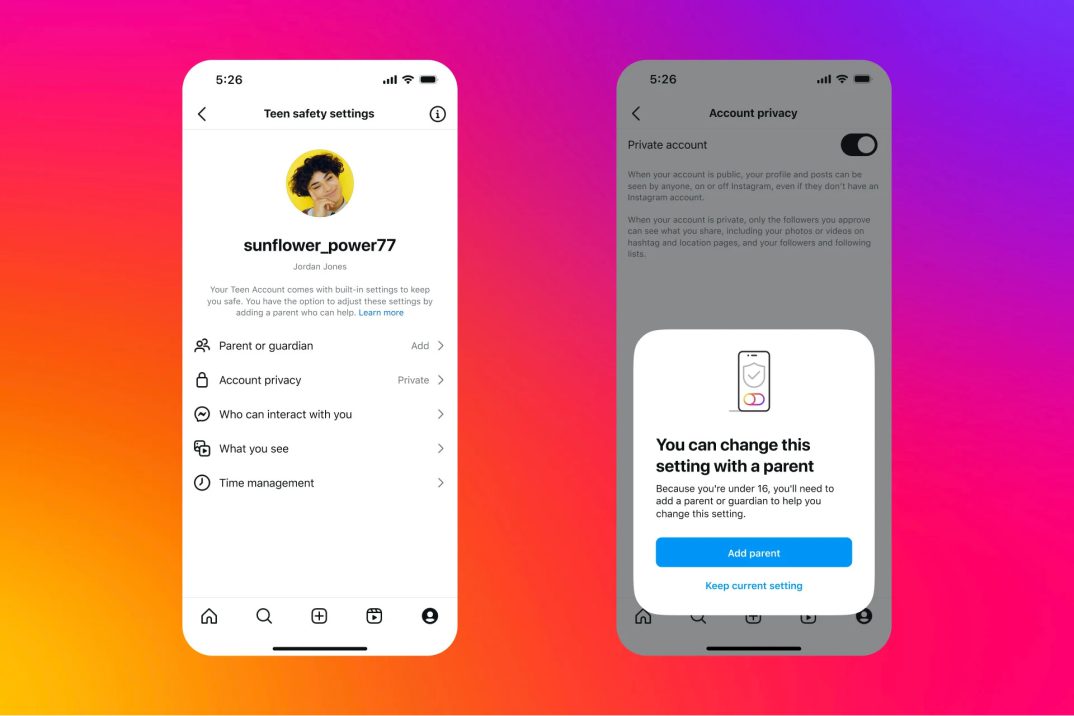Instagram has unveiled Teen Accounts, a new way for its millions of under-18 users to interact with the social media app—including more parental controls.
Set to launch for new users from today and roll out globally in the coming months, this initiative aims to address growing concerns about online safety and content exposure for teenagers by introducing a range of built-in protections designed to limit who can contact teens and the type of content they encounter.
Teen Accounts will be private by default and include messaging restrictions, time-use reminders and filters on content and offensive words designed to tackle bullying.
“We’re reimagining our apps for teens with new Teen Accounts,” Instagram said on its official blog. “This new experience is designed to better support parents, and give them peace of mind that their teens are safe with the right protections in place.”
Screenshot of Instagram’s safety settings in the newly introduced Teen Accounts. New safety settings for under-18 Instagram users will begin rolling out from today.
Meta
Key features of Teen Accounts include:
- Private accounts by default (people who don’t follow them can’t see their content or interact with them.)
- Strict messaging restrictions (they can only be messaged by people they follow or are already connected to.)
- Limited exposure to sensitive content (this limits the type of sensitive content teens see, such as videos and images showing people fighting or promoting cosmetic procedures.)
- Hidden Words feature (auto-on of the most restrictive version of Instagram’s anti-bullying feature that filters out offensive words and phrases from comments and DM requests.)
- Automatic time limit reminders (After 60 minutes of use, a notification will tell users to leave the app.)
- Sleep mode activation (this kicks in between 10 p.m. and 7 a.m., muting all notifications.)
Perhaps most notably, teens under 16 will need parental permission to change any of these settings to be less strict, marking a significant shift in how the platform manages younger users’ autonomy.
Yvonne Johnson, president of child advocacy association the National Parent Teacher Association, said: “With teens automatically placed in Teen Accounts and certain privacy settings turned on by default, this update demonstrates that Meta is taking steps to empower parents and deliver safer, more age-appropriate experiences on the platform.”
However, the effectiveness of these measures hinges on accurate age verification. Instagram said it acknowledged this challenge and planned to implement new technology to proactively identify accounts belonging to teens, even if they have listed an adult birthday. The social media platform said it would begin testing these changes in the U.S. in early 2025.
Dr. Rachel Rodgers, associate professor of Applied Psychology at Northeastern University, said: “Instagram Teen Accounts reflect the importance of tailoring teens’ online experiences to their developmental stages, and implementing appropriate protections.”
Instagram’s Teen Accounts follow earlier teen safety changes made by the social media platform in 2021 including the Take a Break feature that allows parents to set up an alert every 10, 20 or 30 minutes asking their teen to take a break from the app. It also introduced a feature to nudge teens toward different topics if they had spent too much time scrolling through one particular topic.
These teen safety measures were introduced around the same time as data scientist Frances Haugen, a whistleblower who disclosed tens of thousands of Facebook files, testified that documents containing internal research showed that Instagram could have negative mental health repercussions for teens, teenage girls in particular.
At the time, during a 60 Minutes interview aired on CBS, Haugen said: “Facebook’s own research says it is not just that Instagram is dangerous for teenagers, that it harms teenagers, it’s that it is distinctly worse than other forms of social media.”
Meta’s (formerly Facebook) response to Haugen’s allegations was that it carried out “internal research to ask hard questions and find out how we can best improve the experience for teens and we will continue doing this work to improve Instagram and all of our apps”.
Newsweek reached out to Meta via email for comment.



![The Best Time to Post On Social Media in 2024 [All Networks] The Best Time to Post On Social Media in 2024 [All Networks]](https://virtual-coach.com/wp-content/uploads/2024/06/Best-times-to-post-on-social-media-in-2024.png)
